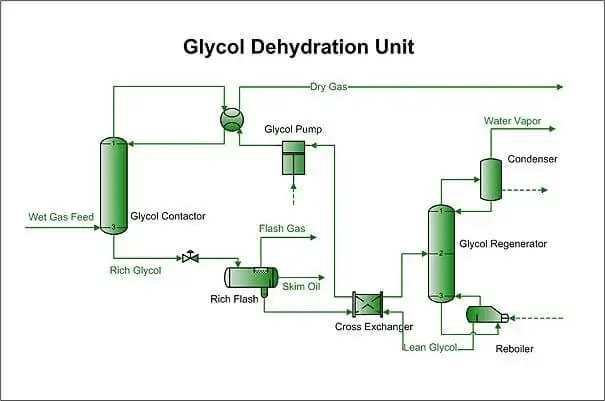Glycol dehydration is a liquid desiccant system for the removal of water from natural gas and natural gas liquids (NGL). It is the most common and economical means of water removal from these streams. Glycols typically seen in industry include triethylene glycol (TEG), diethylene glycol (DEG), ethylene glycol (MEG), and tetraethylene glycol (TREG). TEG is the most commonly used glycol in industry.
In a natural gas processing plant, the purpose of a glycol dehydration unit is to remove water from natural gas and natural gas liquids. When produced from a reservoir, natural gas usually contains a large amount of water and is typically completely saturated or at the water dew point. This water can cause several problems for downstream processes and equipment. At low temperatures the water can either freeze in piping or, as is more commonly the case, form hydrates with CO2 and hydrocarbons (mainly methane hydrates). Depending on composition, these hydrates can form at relatively high temperatures plugging equipment and piping. Glycol dehydration units depress the hydrate formation point of the gas through water removal.

Without dehydration, a free water phase (liquid water) could also drop out of the natural gas as it is either cooled or the pressure is lowered through equipment and piping. This free water phase will often contain some portions of acid gas (such as H2S and CO2) and could cause corrosion.
Effective Glycol Filtration is an important part of the glycol processing system and it is important to keep the glycol to a level of purity so the system will operate as intended to ensure a quality on-spec gas product and no loss of revenue for a non-spec pipeline quality product.
Similar to an Amine System, choosing the correct level (Micron) and type of filtration (Efficiency / Removal Capacity) will provide a multitude of benefits such as reduced maintenance of downstream equipment such as exchangers, pumps, contactor tray plugging, as well as a reduction in corrosion and chemical costs.
Keeping the glycol system to the required specification will ensure optimal system performance for the plant to run effectively with reduced maintenance issues and operational costs that can be associated to a poorly filtered glycol system. Natural gas will be kept on-spec and sales quotas met to maintain bottom line revenues.
Waste can be excessive with improperly designed or undersized filter systems. A properly designed filtration system will reduce your environmental disposal costs and help to reduce as much waste as possible. Consult with an experienced filtration specialist to design a filter solution for your glycol filtration needs.